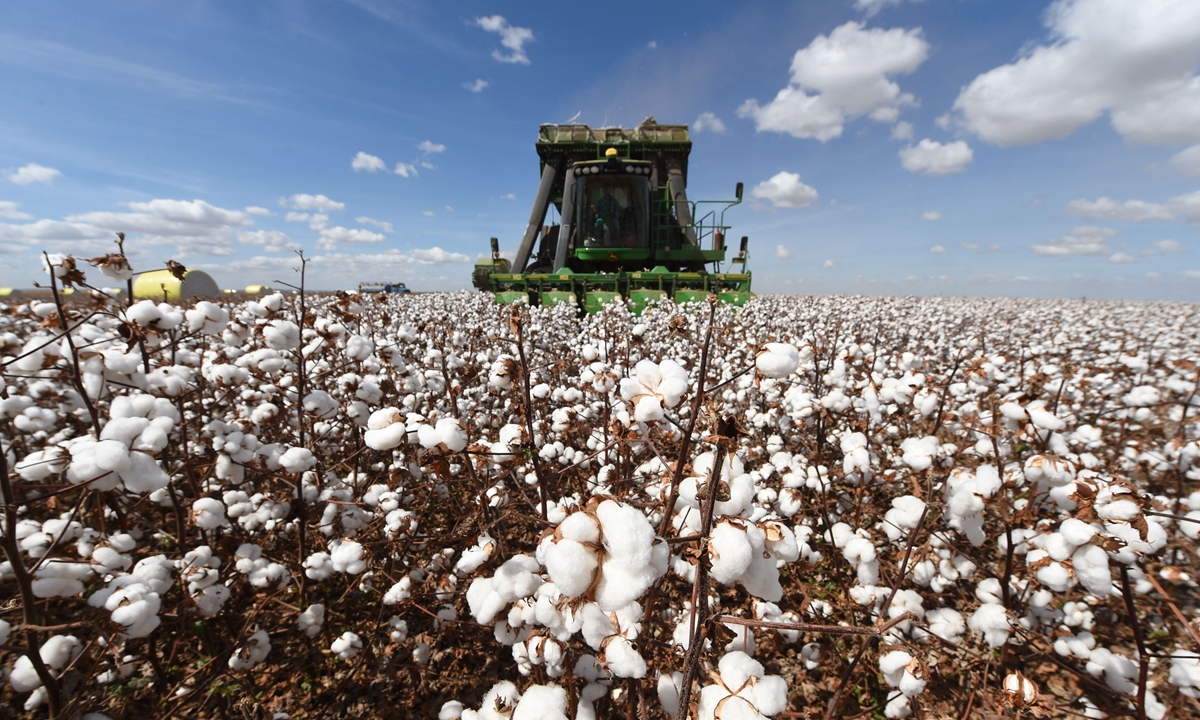
A combine harvests cotton in a field at Pamplona farm in Cristalina, Brazil, on July 14, 2022. Photo: AFP
China Grain Reserves Corporation Group, also known as Sinograin, has recently moved to ramp up cotton purchases, in a bid to ensure stability in the domestic cotton market.
The national stockpiler plans to purchase 6,000 tons of central reserve cotton on Monday, read a post on the WeChat official account of a cotton market tracker affiliated with the stockpiler.
The latest planned purchase is part of Sinograin's efforts to shore up the domestic cotton market. Since July 13, the national stockpile's listed purchases have totaled 119,000 tons, while actualized deals have cumulatively hit 58,480 tons, per the market tracker.
Industry insiders said the purchase is a "regular" move to stabilize the cotton market, so that sinking cotton prices will not squeeze out the profitability of cotton farmers.
"There was no such move last year because cotton prices kept climbing up back that time, and Chinese authorities, in contrast, released cotton stocks several times last year to prevent the market from overheating," Ma Wenfeng, a senior analyst at the Beijing Orient Agribusiness Consultancy, told the Global Times on Sunday.
Nonetheless, the cotton market has reversed this trend. Over the past week ending Friday, insufficient downstream orders continued to weigh on firms' purchasing confidence and consequently domestic spot cotton prices saw a sustained downtrend.
Reserve cotton was traded at an average price of 15,694 yuan ($2,327) per ton, down 84 yuan a ton, or 0.5 percent from the previous week, according to a weekly report compiled by the market tracker.
Observers said multiple factors resulted in this year's cotton price dip, including falling global bulk commodity prices and sapped demand. But they stressed that the US sanctions only play a "marginal" role in local cotton price dives, as most direct Xinjiang cotton exports have been suspended in the last two years, and local farmers are relying more on domestic sales channels.
Zhang Jie, who opened a textile factory in Xinjiang and also has a clothing export company in Shanghai, told the Global Times on Sunday that the recent epidemic flare-ups also sapped Chinese consumer purchases for products including clothes, which led to a growing clothes stockpile that reduced manufactures' demand for upstream raw materials such as cotton and cotton yards.
Globally, many Southeast Asian countries posted lackluster textile orders amid economic recession woes, with home textile manufacturers in India and Vietnam also recording a plunge in export orders, the aforementioned weekly report said, stressing that domestic cotton prices will remain under downward pressure in the foreseeable future.
